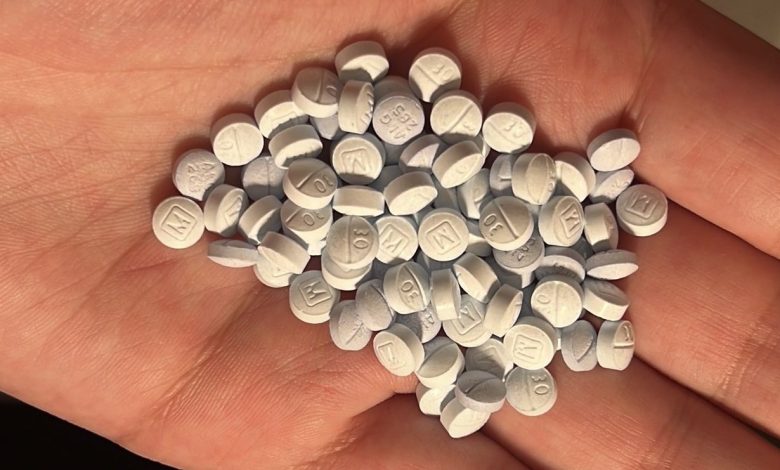What are Blues Drugs?

What are blues drugs?
The term “blues drugs” refers to counterfeit pills that are designed to look like prescription oxycodone tablets. These counterfeit pills are often sold on the street under various names, such as “30s,” “40s,” “512s,” “Oxy,” “Beans,” “Hillbilly Heroin,” and “Roxy”. They are typically made to mimic the appearance of legitimate prescription medications.
One of the significant dangers associated with these “blues drugs” is that they are often laced with fentanyl, a powerful synthetic opioid that is significantly more potent than oxycodone. Fentanyl is about fifty times stronger than heroin and 100 times more potent than morphine. It is a highly potent opioid that can lead to severe respiratory depression and overdose when taken in even small amounts.
The counterfeit pills are concerning for several reasons:
1. Unknown Ingredients: Users cannot be certain of the actual ingredients in these pills, making them extremely risky to consume.
2. Potentially Fatal: Due to the presence of fentanyl, these pills can be exceptionally potent and potentially fatal, especially if someone unknowingly takes a pill with a high fentanyl content.
3. Hard to Identify: Counterfeit pills can be challenging to distinguish from legitimate prescription medications, making it difficult for users to know what they are taking.
The opioid epidemic has seen a rise in the production and distribution of counterfeit pills like these, posing a significant public health concern. Individuals who misuse prescription medications or turn to the black market for drugs are at high risk of encountering such dangerous substances.
In 2021, the United States witnessed a devastating toll of more than 107,600 lives lost due to drug poisoning or overdose. Shockingly, over 71,000 of these fatalities, which accounts for 66% of the total, were attributed to synthetic opioids, with fentanyl being a prominent contributor. This tragic statistic is even more staggering when compared to the nearly 49,000 lives claimed by firearm-related incidents during the same period. This grim reality underscores the enduring and deeply entrenched opioid crisis that has gripped the nation for over two decades, resulting in the tragic loss of more than 760,000 lives.
What’s particularly alarming is the recent surge in overdose deaths, and a significant driving force behind this surge is the proliferation of counterfeit pills. These counterfeit medications, often disguised as familiar prescription drugs, contain hidden dangers that are imperceptible to those who consume them. They contribute to the escalating death toll, posing a severe threat to public health.
Consequently, there is a pressing need for awareness and education about these lethal substances. For instance, if someone were to mention that their friend or family member overdosed from the “Blues,” it is critical to recognize that they are referring to counterfeit pills designed to resemble prescription medications. These “Blues” often contain fentanyl, a synthetic opioid of extreme potency, making them extraordinarily dangerous.
Here’s what to watch out for when trying to spot “blues drugs,”:
| Sign/Symptom | Description |
| Unusual Appearance | Counterfeit pills may have irregular shapes, colors, or markings that differ from legitimate prescription medications. |
| Lack of Imprint | Some counterfeit pills may have no visible imprints, which are common on genuine prescription medications. |
| Unfamiliar Packaging | Packaging materials, including pill bottles or blister packs, may appear inconsistent or of lower quality. |
| Suspicious Sources | Obtaining pills from unofficial sources or unlicensed online sellers is a red flag. |
| Unusual Taste or Smell | A strange taste or odor when consuming a pill can be indicative of counterfeit drugs. |
| Inconsistent Effects | Unexpected, severe, or exaggerated reactions, including dizziness, extreme sedation, or nausea, may suggest counterfeit pills. |
| Rapid Onset of Symptoms | Fentanyl-containing pills can lead to quick and intense symptoms, which can be a dangerous sign. |
| Prolonged Sedation | Excessive drowsiness or unconsciousness may follow the ingestion of counterfeit pills. |
| Respiratory Distress | Shallow breathing, slowed heart rate, or other signs of respiratory distress can be indicators of fentanyl overdose. |
| Suspected Fentanyl Content | Any mention of “Blues,” “30s,” or similar street names for counterfeit pills should raise concerns about fentanyl. |
Addressing the opioid crisis and the proliferation of counterfeit drugs demands a multifaceted approach, including enhanced public awareness, addiction treatment resources, and law enforcement measures. It is crucial that communities, healthcare providers, and law enforcement agencies work collaboratively to combat this ongoing public health emergency and prevent further loss of life.
It is essential for individuals to be aware of the risks associated with counterfeit pills and illicit drugs, and if you or someone you know is struggling with substance abuse or addiction, seeking help from a healthcare professional or addiction specialist is crucial for safety and support. Additionally, harm reduction measures and education on the risks of counterfeit drugs are essential in addressing this issue.





